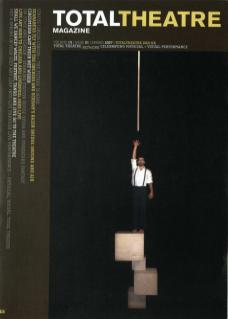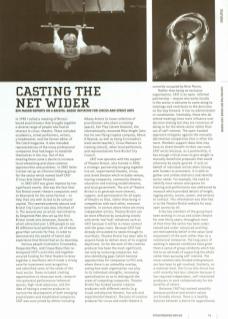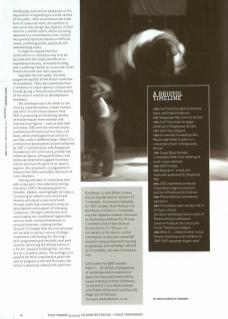In 1998 I called a meeting of Bristol-based practitioners that brought together a diverse range of people who had an interest in circus-theatre. These included academics, street performers, writers, a headmaster, and the former editor of The Catch magazine. It also included representatives of the many professional companies that had begun to establish themselves in the city. Out of this meeting there came a desire to increase local networking and share common opportunities and problems. In 2002 Helen Crocker set up an informal lobbying group for the sector which named itself CAST (Circus Arts Street Theatre).
In 2003 CAST was given impetus by two significant events. One was the fact that five Bristol street-theatre companies went to Newcastle for the same festival – to help that city with its bid to be cultural capital. This seemed patently absurd and Bristol City Council was duly informed of it. The second was an artist-led initiative by Desperate Men who set up the first Bristol street arts showcase, Outside In, which attracted over 1,500 people to see 80 different local performers, all of whom gave their services for free, in order to demonstrate the wealth of talent and experience that Bristol had on its doorstep.
Various people involved in Circomedia, Desperate Men, and Cirque Bijou then re-energised CAST’s activities and together secured funding for Peter Boyden to draw together a manifesto which made a strong case for investment and recognition and identified some of the needs of the local sector. These included creating opportunities to showcase work, research into potential performance/rehearsal spaces, high-level advocacy, and the idea of having a creative producer to nurture the development of both emerging practitioners and established companies. CAST was soon joined by others including Albany Artists (a loose collective of practitioners who share a training space), Fair Play (street theatre), the internationally renowned Mike Wright (who has his own flying trapeze company, Above & Beyond, as well as being Circomedia’s main aerial teacher), Circus Maniacs (a training school), other local performers, and representatives from Bristol City Council.
CAST now operates with the support of Theatre Bristol, also formed in 2003, a strategic partnership bringing together live art, experimental theatre, circus, and street theatre which includes venues, touring companies, community theatre, education and training establishments, and local government. The aim of Theatre Bristol is to generate more interest, support, and participation for all types of theatre so that, rather than being in competition with each other, everyone benefits. In sectors where there are many independent artists, Theatre Bristol can be more effective by consulting closely with artist-led ‘hub’ initiatives such as CAST because it will be in closer contact with the grass roots. Because CAST had already articulated its needs through its manifesto, Theatre Bristol has been able to acquire funds to deliver most of its original objectives. So far the work of the creative producer has been the most significant, not only by nurturing companies, but also identifying gaps (which become opportunities for companies to fill) and, where there is an unhealthy overlap, seeing how each organisation can play to its individual strengths, increasing specialisation so as to distinguish the areas of competing companies. Theatre Bristol has funded several creative producers with different remits (e.g. visual and physical theatre, live arts and experimental theatre). The post of creative producer for circus and street theatre is currently occupied by Briar Monro.
Rather than being an exclusive organisation, CAST is an open, informal partnership – anyone who works locally in the sector is welcome to come along to meetings and contribute to the decisions on the way forward. It has no administrator or constitution. Inevitably, those who do attend meetings have more influence over decision making but they are conscious of doing so for the whole sector rather than out of self-interest. The open-handed approach mitigates against the mutually detrimental competition that is often the norm. Members support ideas that may have no direct benefit to their own work. CAST exists because, as a partnership, it has enough critical mass to give weight to mutually beneficial proposals that would otherwise be easily ignored. It acts on behalf of individual artists when liaising with funders or promoters. It is able to gather and collate statistics and identify sector needs. For example, the need to identify more venues and spaces for training and performance was addressed by research which provided details of height, rigging points, access, power, and persons to contact. This information was then fed in to the Theatre Bristol website for easy open access by all.
A few key members of the group have been working in circus and street theatre for over thirty years; throughout most of that time the sector has been undervalued and under-resourced and they are motivated by belief in the value (and enjoyment) of the work rather than as a commercial enterprise. The long years of working in adverse conditions have given them a sense of group solidarity which has led to an attitude of supporting the whole rather than pursuing self-interest. The more commercially minded entrepreneurs are less keen to get involved. Similarly, on a national level, the Circus Arts Forum has until recently had less cohesion because it has required independent, self-interested producers to work collaboratively for the benefits of others.
Moreover CAST has worked smoothly because political and artistic values are broadly shared. There is a healthy balance between a desire for oppositional, challenging work and an awareness of the importance of appealing to a wide section of the public. Most practitioners do some form of corporate work; the question is how much they design the majority of their work for a market which, whilst not being opposed to a contemporary look, cannot incorporate separate themes or difficult issues, preferring pretty spectacle and undemanding styles.
It might be argued that this constructive co-existence may only be possible with the triple benefits of an expanding economy, increased funding, and a widening market as circus and street theatre become ever more popular.
Arguably the feel-good, mutually supportive quality of the Bristol scene has its drawbacks. There has sometimes been a tendency to avoid rigorous critique with friends giving a false picture of the quality of the work in relation to developments elsewhere.
The challenge now is for them to risk more by experimentation in both content and form. It is for these reasons that CAST is proposing an increasing number of masterclasses from national and international figures – such as that held in October 2005 with the internationally renowned performance provocateur Leo Bassi, which challenged local artists to use their craft in different ways. What If (a professional development project delivered by CAST in collaboration with Kingswood Foundation) will continue to provide free rehearsal space, willing performers, and technical/directorial support for those artists who have the germ of an idea to explore. Also planned is a programme to enhance the skills and widen the vision of local directors.
Having achieved its initial aims and with a new part-time advocate coming into post, CAST is developing plans to broaden, deepen, and highlight its impact, continuing to embed circus and street theatre activity at a very local level: through youth and community projects, development and support of emerging companies, through commissions and encouraging non-traditional approaches such as small-scale performances in unusual locations. Looking further forward it is hoped that the new advocate will be able to attract serious strategic investment and funding for the longterm programming of festivals, and work towards relocating the Albany Artists in a fit-for-purpose building that can also act as a creation centre. The ecology is at present far from complete but given the rate of progress in the last five years the future is generally viewed with optimism.
A BRISTOL TIMELINE
1986 Fool Time founded by Richard Ward and Franki Anderson
1987 Desperate Men move to Bristol
1992 Fool Time move to larger premises in Kingswood, Bristol
1993 Fool Time collapse
1994 Circomedia founded by Bim Mason and Helen Crocker in a converted school in Kingswood, Bristol.
1998 Cirque Bijou formed Circomedia holds first meeting of local circus interests
2002 CAST formed
2003 Outside In street arts showcase produced by Desperate Men
2003 CAST manifesto produced Cirque Bijou begin to produce section of Harbourside Festival 2004 Theatre Bristol commences operation
2005 Circomedia open second site in St Paul’s church Leo Bassi workshops held as part of Theatre Bristol conference Creative Producer for Circus and Street Theatre post begins
2006 What If… creative week. Circus Futures showcase and conference 2007 CAST advocate begins work
Bim Mason is, with Helen Crocker, the co-founder and co-director of Circomedia. Circomedia highlights for 2007 include: Mask Making with Bim Mason 3–4 March. Circomedia one year diploma students showcase at Glastonbury Festival 23–24 June Circomedia End of Year Show at Bristol Old Vic 27–30 June. For full details of the above, and for information on the year-round full and part-time professional training programmes and workshops offered by Circomedia, see www.circomedia. com
CAST events for 2007 include: What If… 10–18 Feb. A programme of workshops and an exploration space for circus and street artists based in Bristol and the Southwest. Street Arts & Circus Masterclasses with Phelim McDermott and Marcello Magni 16–19 February See www.theatrebristol.co.uk


